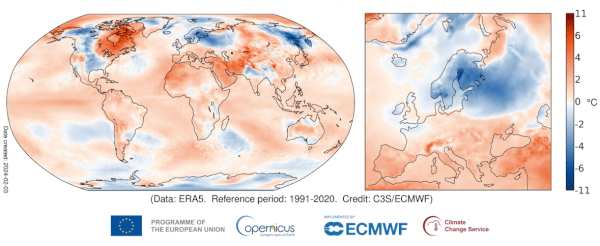🌡️ January 2023 sets record as hottest ever, surpassing 1.5°C benchmark
🌍 Copernicus Climate Change Service confirms the planet's temperature exceeded the critical 1.5°C mark over the past year

The Copernicus Climate Change Service (C3S) has confirmed that the average global temperature for January 2023 was 1.66°C above pre-industrial levels, marking it as the warmest January on record. This follows a 12-month period during which the planet's temperature exceeded the critical 1.5°C benchmark. C3S recorded an average surface air temperature of 13.14°C in January 2024, which is 0.7°C above the 1991-2020 average for the month and 0.12°C above the temperature of the previous warmest January in 2020. 🌏
Despite cold weather in parts of the northern hemisphere, 2024 began with a January that was significantly warmer than the average for the 1850-1900 reference period. Climate scientists have warned that global temperatures must not rise more than 1.5°C above this pre-industrial period to prevent the most severe impacts of climate change. "2024 starts with another record-breaking month," commented C3S Deputy Director Samantha Burgess. "Rapid reductions in greenhouse gas emissions are the only way to stop global temperatures increasing." 🌡️
Temperature variations were observed across Europe and other parts of the world. While Nordic countries experienced below-average temperatures, southern Europe saw temperatures well above average. Similarly, eastern Canada, north-western Africa, the Middle East and central Asia had above-average temperatures, whereas western Canada, the central USA and most of eastern Siberia were colder than usual. The El Niño warming phenomenon began to weaken in the equatorial Pacific, but marine air temperatures remained unusually high. The UK's Met Office predicts more global temperature records will be broken in 2024, which is almost certain to be the warmest year on record. 🌍





